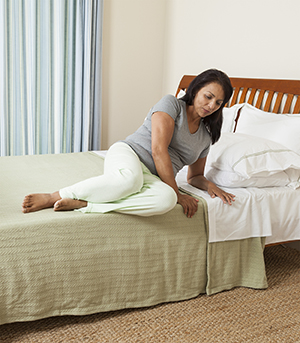A
B
C
D
E
F
G
H
I
J
K
L
M
N
O
P
Q
R
S
T
U
V
W
X
Y
Z
Topic IndexLibrary Index
Click a letter to see a list of conditions beginning with that letter.
Click 'Topic Index' to return to the index for the current topic.
Click 'Library Index' to return to the listing of all topics.
Getting Around with Parkinson Disease
Parkinson disease affects muscle control and coordination. This often makes your movements slower and less automatic. You may take small, shuffling steps and tend to lean forward. You may also feel “frozen” and unable to move at times, as if your feet feel stuck to the floor. The tips below can help with common movements. If needed, your healthcare provider may also advise using a cane or walker. Evaluation by a physical therapist may provide you with other tricks to getting around. Remove any throw rugs or clutter to reduce your risk of falls.
Getting out of bed
-
Turn onto your side with your knees bent.
-
Move your feet off the edge of the bed, using your arms to help you sit up.
-
Sit at the edge of the bed with your feet on the floor and knees apart.
-
Push down with your hands and rock forward to stand up.
-
Stay standing for at least 1 minute before trying to take your first step. If you feel dizzy or lightheaded, sit back down on the bed.
-
Adjust the height of your bed, if needed, to make it easier to stand.

Walking and turning
-
Raise your legs from the knee and take high, long steps. Let your heel fall first with each step. Swing your arms as if you’re marching.
-
Imagine that you’re stepping over a series of lines on the floor. This can be especially helpful if you feel frozen.
-
To turn, walk in a half circle instead of trying to stop and turn in place.
Getting up and sitting down
-
To get up, scoot your hips to the edge of the chair. Keep your feet flat on the floor with knees apart.
-
Put your hands on the armrests.
-
Rock forward and push down on the armrests to stand. It may help to rock back and forth to build momentum.
-
To sit down, back up to the chair as close as you can.
-
Lean forward and bend your knees.
-
Use the armrests to lower yourself onto the chair.
Online Medical Reviewer:
Anne Fetterman RN BSN
Online Medical Reviewer:
Marianne Fraser MSN RN
Online Medical Reviewer:
Rita Sather RN
Date Last Reviewed:
4/1/2024
© 2000-2024 The StayWell Company, LLC. All rights reserved. This information is not intended as a substitute for professional medical care. Always follow your healthcare professional's instructions.